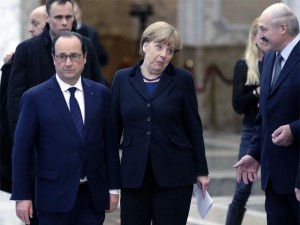Poland and Germany were both initiators and drivers of a New Eastern policy linked to the Eastern neighborhood and Russia/Soviet Union.
Andrei Yahorau: Belarus shouldn’t expect anything from the Riga Summit

The expectations are limited to initialing of agreement in the sphere of visa regime simplification, signing of which is being hindered by a number of moot points.
Belarus is still ambiguous as to the representation at the Eastern Partnership Summit in Riga that is to take place on May 21-22 in the capital of Latvia. Although other countries-members of EaP have already decided on it: Riga will be visited by Ukraine President Petro Poroshenko, Armenia President Serzh Sargsyan, Azerbaijan President Ilham Aliyev, Moldova President Nikolae Timolfti, and Georgian Prime Minister Irakli Garibashvili.
The official invitations to the countries-members of the EaP were signed by the President of the EU Council Donald Tusk, Jean-Claude Juncker, the President of the European Commission, and Laimdota Straujuma, the Prime Minister of Latvia.
Andrejs Pildegovičs, the state secretary for Foreign Affairs of Latvia, emphasized that “the Riga Summit will give an opportunity to access the reached progress from the previous EaP Summit that took place in Vilnius in autumn of 2013”.
Latvia President Andris Bērziņš announced that he is ready to organize the official meeting with Alexander Lukashenko if he is ready to come to the Eastern Partnership Summit.
Why is the official Minsk still keeping its ambassador to the Summit in secret? What can Belarus count at in Riga? Andrei Yahorau, co-chair of the Eastern Partnership Civil Society Forum, country facilitator for Belarus of the EaP CSF, and the Director of the Center for European Transformation, answered the questions of the EuroBelarus Information Service.
— In contrast to other countries-members, Belarus is still ambiguous about its representation at the Eastern Partnership Summit in Riga. Why is so?
— Each time on the eve of the international summits the EU starts unclear game when it is absolutely unclear who is invited. For Lukashenko to visit Riga a number of certain terms need to be fulfilled. And because of this fuss the decision re Belarus’ representation at the EaP Summit in Riga is being postponed.
— Lukashenko isn’t very willing to go to Riga, is he?
— For the Belarusan leader to go to the Riga Summit a number of formal procedures need to be fulfilled. Lukashenko is under the sanctions introduced by the EU Council, and it is only for this Council to decide whether to let Lukashenko enter Riga or not.
To initiate the consideration of this issue Latvia’s inquiry to the EU Council is needed. If at least one country out of 28 will be against that Lukashenko won’t go.
Latvia hasn’t submitted an inquiry to the EU Council re Lukashenko’s participation in the Riga Summit, and that is the reason why Belarusan authorities are dawdling.
— What Belarus is to expect from the Riga Summit?
— Belarus shouldn’t expect anything from the Riga Summit: neither Belarus did anything to build serious expectations not the EU knows what should it do with the Eastern Partnership so that it influenced Belarus more. It is the maximum Belarus can count at.
The first signing of the agreement can take place but the following procedures (ratification and so on) will take certain time. However, now we don’t even witness the readiness of the parties to put their signatures under the agreement: there are a number of hindrances connected with diplomatic passports and other arguable moments that don’t permit the agreement to be signed right away. Perhaps, we will be able to coordinate arguable moments before the Riga Summit and the agreement will be signed. It would be very good.
— What is the National Platform of the Civil Society Forum awaiting from the Riga Summit?
— Simultaneously with the Eastern Partnership Summit in Riga the civil society conference will be taking place, where representatives of all National Platforms of the EaP countries are invited. Ulad Vialichka, Ales Bialiatski, and I will present the Belarusan National Platform.
Judging by the former conferences, we have no particular hopes. But at least we have an opportunity to voice all key problems of the civil society on the eve of the Summit. Issues with human rights, political freedoms, and terms for civil society work are moving more and more away for the unclear perspectives of Belarus’ neutrality in the Russia-Ukraine conflict and illusory perspectives of cooperation between the Belarusan authorities and the EU.
Others
-
Uladzimir Matskevich: The sooner the "Union State" is denounced, the better for Belarus
Not only does the “Union State” undermine the establishment of civilized relations with Europe, but it hinders the possibility of normal relations between Belarus and Russia.
-
Uladzimir Matskevich: The regime can no longer control the situation in the country
The authorities are unable to prolong the social contract with the people: there is no way out of the social crisis.
-
Press release of the BNP in connection with the next round of the dialogue in the format of the EU-Belarus Coordination Group
Belarusan National Platform of the Eastern Partnership Civil Society Forum welcomes the dialogue process in the format of the EU-Belarus Coordination Group, the third round of which was held in Minsk on 3-4 April 2017.
-
Hennadiy Maksak: Europe must react adequately to the events in Minsk
A new wave of political repressions should make the EU return to tougher policy towards the Belarusan regime.








Comments
From farewell to a new Eastern policy and towards a new development
Poland and Germany were both initiators and drivers of a New Eastern policy linked to the Eastern neighborhood and Russia/Soviet Union.